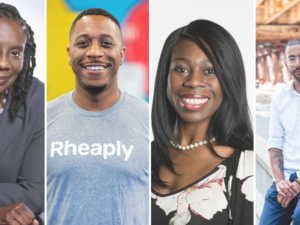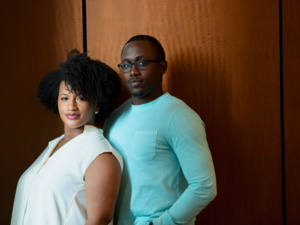Last year during the height of the pandemic, David Umeh moved his startup from San Francisco to Chicago.
He was growing tired of the predominantly white and exclusive “bro” culture in Silicon Valley and wanted to find a new startup hub that was more inclusive of founders of all backgrounds. After some research, he decided to try out the Windy City to grow his company Clouty, a music prediction platform that turns real-time music metrics into tradeable indexes.
Shortly after arriving, he was accepted into 1871’s first BLK•Tech with Verizon accelerator program, one of several new initiatives aimed at making Chicago’s startup industry a more supportive place for Black founders.
After the murder of George Floyd and Breonna Taylor, and Black Lives Matter protests that covered the country last summer, including Chicago, local startup leaders made commitments to embrace diversity, equity and inclusion like they never had before.
Startup CEOs and investors alike were saying “Black Lives Matter” publicly, and many announced new initiatives or programs to show they meant business when it came to supporting the industry’s Black entrepreneurs.
Over the last year, Chicago’s startup scene has seen new accelerator programs for Black and Brown founders, new pitch competitions for them to compete in, and new investment funds to support their ventures.
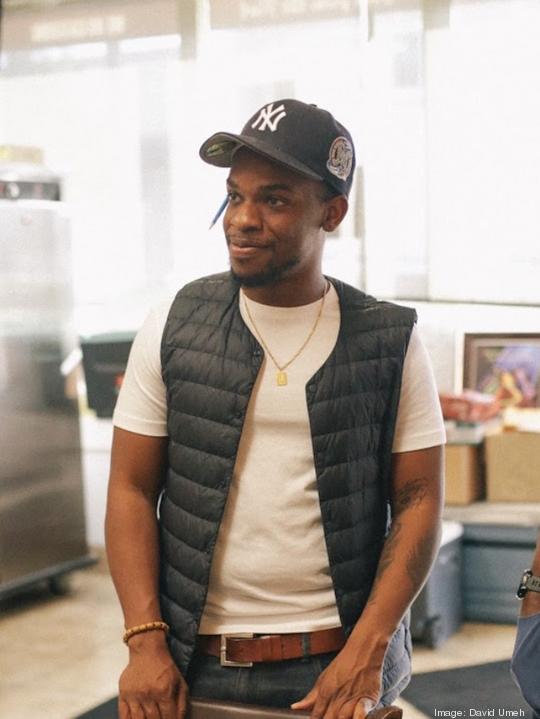
The mere fact that programs like this exist now and didn’t a year ago shows that there has been some progress in creating a more inclusive startup industry for Black and Brown entrepreneurs in Chicago.
While new accelerator programs and pitch competitions aren't transforming circumstances for many Black and Brown entrepreneurs overnight, many in Chicago's startup scene believe a foundation was laid in the last year that will translate to dramatic changes in years to come, whether it's around giving underrepresented founders more exposure or venture capital.
Umeh is hoping this is the case for his startup and others. He said 1871’s accelerator was useful in networking with other Black founders, as well as the 1871 network at large.
“I left knowing more people than I did when I got in,” Umeh said. “I left with more knowledge … and that’s important. You get out what you put in.”
The recurring 12-week program offers participants workshops, one-on-one mentoring from other Black entrepreneurs, as well as business training through 1871’s PYROS education program.
“It was useful in several ways,” said Tanisha Hemphill, another BLK•Tech participant and the founder of Black Mom Resource. “It really focused on how to conduct your business and how to set your business up for success.
“And BLK•Tech specifically focused on what your experience is like as a Black founder,” Hemphill continued. “It gave us a safe space to have conversations about our burnout, exhaustion or the external events outside of our business that are impacting us.”
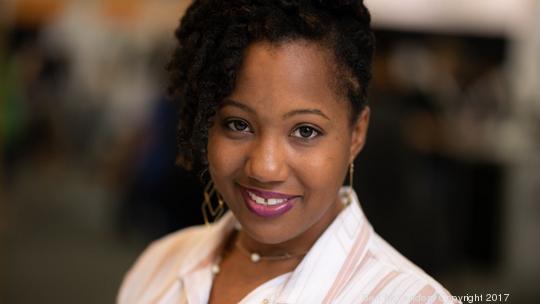
Black Mom Resource is a website for Black mothers to discuss parenting, racism and finances. It originated from a Facebook page Hemphill started in 2016. Hemphill, who has had a 13-year career in tech and is currently a product manager at Expedia, said BLK•Tech was useful to her business and that she expects it to be helpful in the long-term for other Black founders in Chicago.
Now that the program is over, Hemphill and Umeh are looking to take what they’ve learned and transition their businesses into the next stage. For Umeh, that means raising capital, but so far, he says he has had difficulty raising a $1.5 million seed round from Chicago investors.
“Being a Black founder is pretty daunting and there is a lot of performative behavior that happens,” Umeh said. “There’s a lot of barking and not a lot of biting when it comes to Black founders actually being able to raise that round. But you can’t let their ‘no’ devalue your worth just because you’re not part of the pattern bias.”
Investing in ‘overlooked’ founders
To help break down a long history of pattern bias, in which investors look for founders and companies they’ve seen be successful before, new Chicago venture capital firm LongJump launched earlier this year.
Led by active startup founders like 4Degrees’ Ablorde Ashigbi and Paladin’s Kristen Sonday, the firm, which calls itself a “first-check” fund, is taking a different approach to sourcing deals. To democratize how founders get in front of investors at LongJump, the firm offers an application process, cutting down on network homogeneity that often leads to the same types of people landing funding over and over again.
“Our entire goal at LongJump is to really elevate Chicago’s startup ecosystem by investing in underrepresented founders and ideas, who would typically get overlooked for funding,” Sonday said. “Our goal is to really have our portfolio be more reflective of the demographics of the city, which is why we took a very intentional approach to sourcing founders from diverse backgrounds.”
LongJump’s first round of applications closed in April, and Sonday said that 91% of the companies who applied had at least one founder from an underrepresented group, which includes female, Black, Hispanic, Latinx, Asian-American, immigrant and LGBTQ+ founders.
“I am so excited by the companies we are seeing,” Sonday said.
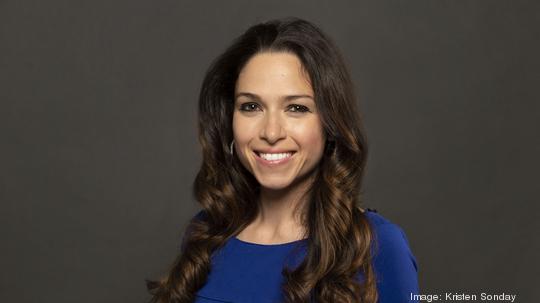
LongJump is now picking investments and plans to announce them later this summer, Sonday said. Checks will range from $50,000 to $100,000, which are relatively small amounts of capital in Chicago, but LongJump’s thesis is that underrepresented founders have to start somewhere.
“It’s all about changing the face of what successful entrepreneurs look like in Chicago,” Sonday said. “We’re focused on filling that capital gap that then in turn affects folks’ ability to build sustainable and scalable businesses with the traction and track record that VCs in Chicago typically expect and want to see in order to invest later on.”
Being a startup founder and Latinx herself, Sonday knows firsthand the obstacles that underrepresented entrepreneurs face every day. Her company, Paladin, is a legal tech startup that connects lawyers to pro bono work. It currently employs 11 people and has raised nearly $2 million to date. Despite the obstacles she’s faced since launching her company six years ago, she said she feels optimistic about the opportunities for underrepresented founders in Chicago.
Other new funds in Chicago focused on investing in diverse entrepreneurs include Cleveland Avenue's $70 million food innovation fund and Supply Change Capital, which invests in early-stage food companies.
“There have been so many new programs and initiatives that have sprung up as a result of the racial justice events of last summer,” Sonday said. “But it does take time. I would expect to see some real change by the end of this year.”
No longer an outlier
Once 2021 is over, P33, an organization aimed at transforming Chicago into a top-tier startup hub, will have hosted 30 startup pitch competitions for 150 underrepresented founders.
Called TechRise, and co-run with 1871 and Verizon, the program was introduced earlier this year with the mission of hosting weekly pitch competitions for the city’s Black and Latinx entrepreneurs to vie for cash grants.
Local venture capitalists and other startup leaders judge the competitions, with the idea being that VCs will be exposed to more founders of color to invest in down the line. So far, judges have included notable tech and investment leaders like Techstars Chicago Managing Director Neal Sáles-Griffin, Chicago Ventures Partner Jackie DiMonte and Corazon Capital co-founder and serial entrepreneur Sam Yagan.
Over the next three years, P33 plans to give $5 million to founders out of its fund, which is fueled by corporate and philanthropic donations, as well as crowdfunding. Checks range from $10,000-$50,000.
So far, TechRise says it has funded five founders, 60% of whom are women and 80% of whom are Black.
“I’m used to being an outlier as a Black woman, but it was nice and refreshing to not feel like the outlier,” said Taylor Elyse Morrison, the founder of Inner Workout and a recent winner of a TechRise competition. “It’s affirming to see that there are a lot of us. There are people like us who are investors. There are people like us who are entrepreneurs.”
Winning her TechRise competition, Morrison landed a $20,000 cash prize, which she says will be used to develop her business. Launched in 2019, Inner Workout helps users develop self-care routines by offering workshops, retreats and informational resources.
“We’re working towards a world without burnout,” Morrison said. “We bill ourselves as your self-care support system.”
Morrison said seeing other people of color leading programs like TechRise and LongJump provides an added layer of legitimacy to their missions, saying that she hopes these programs make a more lasting impact than other DEI programs in the past.
“I worry about vanity metrics within this DEI space,” Morrison said. “When we focus on those vanity pieces, we lose sight of the impact, but people still feel like they’ve done something that they can pat their back about.”
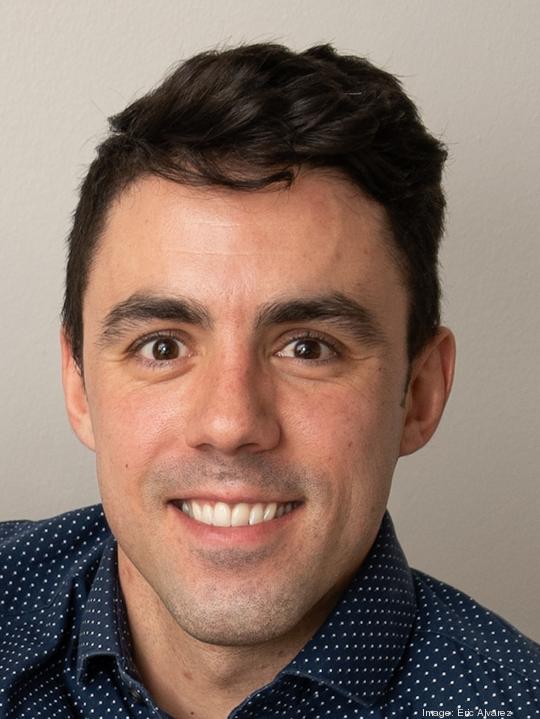
Eric Alvarez, the founder and CEO of Grapefuit Health, also recently won $20,000 at a TechRise competition. His company recruits nursing students to provide remote care to at-risk seniors living alone. With the new funding, Alvarez said he is now able to launch a pilot program to test his tech, showing that P33 is not only providing exposure to startups, but also meaningful amounts of capital.
“There’s a lot of programs out there that are very much ‘lip service’ programs,” Alvarez said. “What [P33] is doing is so awesome, impactful and far bigger than anything I’ve ever seen.”
How the discourse has changed
For many Black startup founders and workers in Chicago, the last year of more open discourse about racism and discrimination has felt validating and necessary.
“Last year, for the first time, we had a unified conversation around the topic,” said Claude Cimeus, a product manager at unicorn startup ActiveCampaign. Before ActiveCampaign, Cimeus worked at other local startups, such as Forager, ShopRunner and Visibly.
Cimeus and many others have worked to keep the DEI conversation going within the last year, hosting virtual events on the topic. Cimeus’s next event on June 15 is slated to cover anti-Asian hate and the unique struggles the Asian-American and Pacific Islander community face. People like Jieying Zheng, the senior vice president of product at Chowbus, and Joey Mak, the executive director of Chicago Blend, are set to speak.
“Here we are again [talking] about another marginalized group facing injustice,” Cimeus said. “A lot of Asian-Americans are living in fear and that’s kind of how I was feeling last summer.”
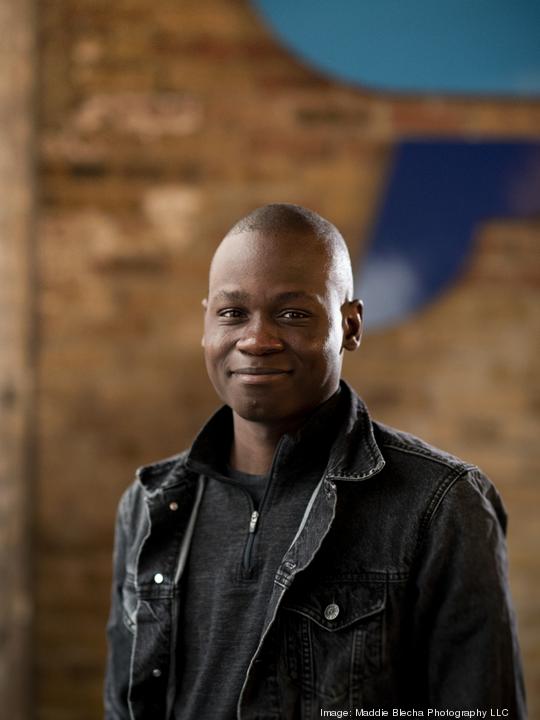
The new welcoming environment to chat about social issues in the city’s tech and startup scenes has mostly led to positive change and collaboration, as well as a small increase in the number of Black and Latinx people working at local startups, which is why it was shocking to many when local software company Basecamp recently banned its employees from talking about social issues and politics at the office.
Over the course of a week, Basecamp’s founders announced the ban and effectively shut down an employee-led DEI committee, then saw one-third of their staff resign in response.
“It’s fairly disappointing,” Cimeus said of the Basecamp saga. “I don’t know what I’d do with myself if I couldn’t talk about this kind of stuff. Work is 90% of your waking hours.
“I can’t imagine what it would be like if I couldn’t talk about the fact that I was essentially mourning after George Floyd,” Cimeus continued. “I felt like a family member had died. If I couldn’t process that with my teammates or people I work with, the year would have probably been 10 times harder.”
